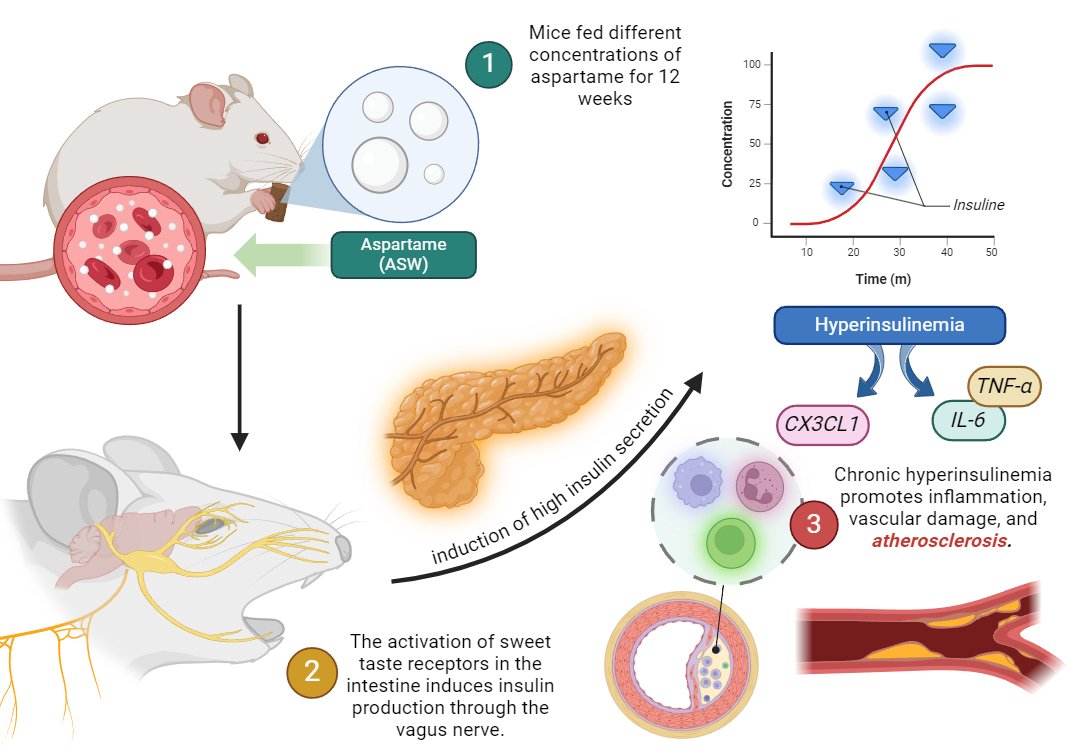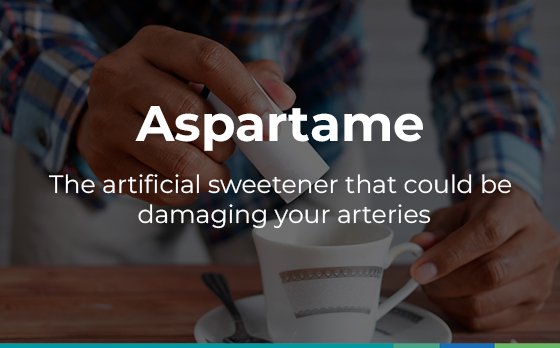Aspartame has been a popular sugar substitute for decades, promoted as a calorie-free sweetener that helps reduce sugar intake without affecting blood glucose levels. However, new studies have begun to question its long-term safety. Recent research published in Cell Metabolism by Wu et al. (2025) has revealed a concerning link between aspartame consumption and inflammation in the arteries, a key factor in the development of cardiovascular diseases such as atherosclerosis.
Researchers discovered that aspartame can unexpectedly alter insulin regulation in the body. Although this sweetener provides no calories or glucose, its consumption stimulates insulin release through vagus nerve activation, suggesting that the brain and nervous system play a key role in its metabolic impact.
The study, conducted in mice and monkeys, showed that exposure to aspartame increased insulin levels in the blood while simultaneously promoting inflammation in endothelial cells of blood vessels. The key to this process appears to be the production of CX3CL1, a molecule that facilitates the adhesion of immune cells to arterial walls. This process can trigger a chain reaction in which monocytes and macrophages, two types of immune system cells, accumulate in the endothelium, generating chronic inflammation and facilitating the progression of atherosclerosis.
Scientists believe that the reason why aspartame induces insulin production is related to the activation of sweet taste receptors in the intestine. Normally, when the body detects a sweet taste in the mouth or digestive tract, the nervous system interprets that glucose is entering and activates mechanisms to anticipate its arrival. This signal is transmitted through the vagus nerve, which connects the intestine with the brain, triggering a response that includes insulin release from the pancreas. However, in the case of aspartame, this response is activated without actual glucose in the blood, which could lead to unnecessary insulin secretion and, over time, alter sensitivity to this hormone.
Additionally, excess insulin can act as a pro-inflammatory agent, exacerbating vascular inflammation. Chronic hyperinsulinemia activates various molecular pathways involved in inflammation, such as the PI3K/AKT/mTOR pathway, which regulates cell growth and immune function. When this pathway is excessively activated, it increases the production of inflammatory molecules such as CX3CL1, which promote the recruitment of immune cells to the endothelium. Elevated insulin levels have also been shown to stimulate the production of IL-6 and TNF-α, two key cytokines in chronic inflammation, further worsening vascular damage.
Experiments showed that mice exposed to aspartame for several weeks developed higher levels of CX3CL1 and greater infiltration of inflammatory cells in their arteries. Furthermore, when CX3CL1 receptors were genetically blocked in mice, a reduction in vascular inflammation and atherosclerotic plaque formation was observed. This confirms that insulin-induced inflammation is a key factor in the arterial damage observed in the study.
Findings were also replicated in cynomolgus monkeys, suggesting that these effects are not exclusive to mice and could be relevant in humans. In monkeys, aspartame consumption significantly increased insulin secretion and led to changes in glucose regulation, reinforcing the idea that this sweetener could affect metabolism in ways previously unconsidered.

Figure 1. Aspartame stimulates the vagus nerve, increasing insulin and promoting arterial inflammation through CX3CL1, IL-6, and TNF-α, contributing to atherosclerosis.
Beyond its impact on the vascular system, this study raises new questions about how aspartame could affect other metabolic and immune processes in the body. Chronic inflammation is a common factor in various diseases, from diabetes to neurodegenerative disorders, making these findings even more relevant.
Although clinical studies in humans have yet to confirm these effects, this work strengthens the need to reconsider the long-term safety of aspartame consumption. As we advance in understanding how artificial sweeteners affect our metabolism, it is essential to evaluate their impact on cardiovascular health and explore safer alternatives in daily nutrition.
Main Reference:
Wu, W., Sui, W., Chen, S., Guo, Z., Jing, X., Wang, X., Wang, Q., Yu, X., Xiong, W., Ji, J., Yang, L., Zhang, Y., Jiang, W., Yu, G., Liu, S., Tao, W., Zhao, C., Zhang, Y., Chen, Y., … Cao, Y. (2025). Sweetener aspartame aggravates atherosclerosis through insulin-triggered inflammation. Cell Metabolism. https://doi.org/10.1016/j.cmet.2025.01.006
Other References:
Ghusn, W., Naik, R., & Yibirin, M. (2023). The Impact of Artificial Sweeteners on Human Health and Cancer Association: A Comprehensive Clinical Review. Cureus, 15(12), e51299. https://doi.org/10.7759/cureus.51299
Wheatcroft, S. B., Williams, I. L., Shah, A. M., & Kearney, M. T. (2003). Pathophysiological implications of insulin resistance on vascular endothelial function. Diabetic medicine : a journal of the British Diabetic Association, 20(4), 255–268. https://doi.org/10.1046/j.1464-5491.2003.00869.x


